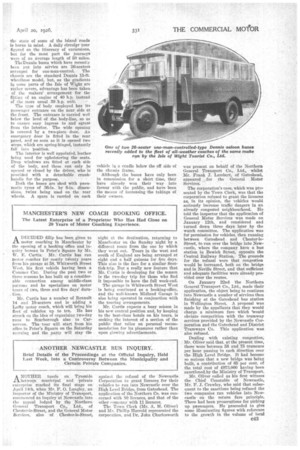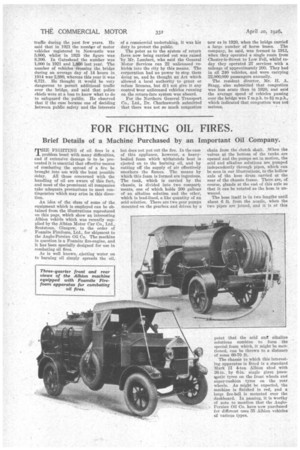MANCHESTER'S NEW COACH BOOKING OFFICE.
Page 27

Page 28

If you've noticed an error in this article please click here to report it so we can fix it.
The Latest Enterprise of a Proprietor Who Has Had Close on 20 Years of Motor Coaching Experience.
ADECIDED fillip has been,. given to motor coaching in Manchester by the opening of a booking office and inquiry bureau in Peter's Square by Mr. W. E. Curtis. Mr. Curtis has run motor coaches for nearly tvienty years from his garage at 58, Whitworth Street West, his first vehicle having been a Commer Car. • During the past two or three seasons he has built up a considerable connection among middle-class patrons and he specializes on motor tours of two, three and five days' dura..-ton.
Mr. Curtis has a number of Renault 14 and 18-seaters and is adding a Laffly motor coach, which will bring his fleet of vehicles up to ten. He has struck on the idea' of organizing two-day runs to Scarborough also to Carnnrvon. The • tour will start from his office in Peter's Square on the Saturday morning and the Tarty will stay the
night at the destination, returning to Manchester on the Sunday night by a different route from the one by which they went out. Tours in the west and south of England are being arranged at eight and a half guineas for five days. This also is the fare for a similar Scottish trip. But a really new feature that Mr. Curtis is developing for the season is the two-day trip for those who find it impossible to have the full week-end.
The garage in Whitworth Street West is being continued as a booking-office, and the well-known Midland Garage is also being operated in conjunction with the touring arrangements.
Mr. Curtis expects a busy seitson in his new central position and, by keeping to the best-class hotels on his tours, is seeking the interest of a section of the public that relies on personal recommendation for its pleasures rather than upon glowing advertisements. was present on behalf of the Northern General Transport Co., Ltd., whilst Mr. Frank J. Lambert, of Gateshead, appeared for the General Motor Services.
The corporation's case, which was presented by the Town Clerk, was that the corporation refused to grant the licences as, in its opinion, the vehicles would seriously increase traffic dangers in an already congested neighbourhood. He told the inspector that the application of General Motor Services was made on January 12th, and considered and turned down three days later by the watch committee. The application was for permission for vehicles, then running between Gateshead and Chester-leStreet, to run over the bridge into Newcastle, where the company have a bus station in Bewick Street, opposite the Central Railway Station. The grounds for the refusal were that congestion would be increased, both on the bridge and in Neville Street, and that sufficient and adequate facilities were already provided over the routes.
On January 22nd the Northern General Transport Co., Ltd, made their application, the object being to continue into Newcastle a number of services then finishing at the Gateshead bus station in Wellington Street. A proposal was made by the appellants that they would charge a minimum fare which 'would obviate competition with the tramway services provided by the Newcastle Corporation and the Gateshead and District Tramways Co. This application was also refused.
Dealing with existing congestion, Mr. Oliver said that, at the present time, there were between 58 end 75 tramcars per hour passing in each direction over the High Level Bridge. It had become so serious that a new bridge was being built, a contribution of 65 per cent, of the total cost of £973,000 having been sanctioned.by the Ministry of Transport.
Mr. Oliver called as his first witness the Chief Constable of Newcastle, Mr. F. J. Crawley, who said that subsequent to the sanctions being refused the two companies ran vehicles into Newcastle on the return fare principle. There had been prosecutions for picking up passengers. He proceeded to give some illuminating figures with reference to the growth in the volume of local
traffic during the past few years. He said that in 1921 the number of motor vehicles registered in Newcastle was 5,000, whilst in 1925 the figure was 8,300. In Gateshead the number was 1,000 in 1921 and 1,860 last year. The number of vehicles crossing the bridge during an average day of 14 hours in 1914 was 2,890, whereas this year it was 6,721. He thought it would be very dangerous to permit additional traffic over the bridge, and said that police chiefs were at a loss to know what to do to safeguard the public. He observed that if the case became one of deciding between public safety and the interests of a commercial undertaking, it was his duty to protect the public.
The point as to the system of return fares now being carried out was raised by Mr. Lambert, who said the General Motor Services ran 22 unlicensed ,vehiclds into the city by this means. The corporation had no power to stop them doing so, and he thought an Act which allowed a local authority to grant or refuse licences, but did not give it any control over unlicensed vehicles running on the return-fare system was absurd.
For the Northern General Transport Co., Ltd., Dr. Charlesworth submitted that there was not so much congestion
now as in 1920, when the bridge carried a large number of horse buses. The company, he said, was formed in 1913, when they operated a single route from Chester-le-Street to Low Fell, whilst today they operated 27 services with a mileage of approximately 200. They had in all 240 vehicles, and were carrying 22,000,000 passengers annually.
The resident director, Mr. H. A. Stagg, also submitted that congestion was less acute than in 1920, and said the average speed of vehicles passing over the bridge was 7 m.p.h. to 8-i m.p.h., which indicated that congestion was not serious.
































